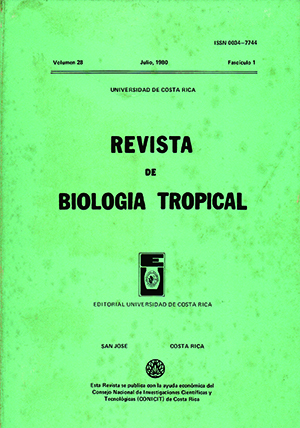Abstract
Electron and light microscopy show that the foliar tissues of beans affected by the Bean Rugose Mosaic Virus (BRMV) disease undergo strong histologic and cytologic changes. The leaf blade is rugose and irregular, the stomata are malformed, the cuticle is striated, the mesophyll is packed and the intercellular spaces are missing. There are few, small and clear-colored chloroplasts; occasionally, they are degenerated. Sclerotic cells filled with phenolic substances are frequently found in severely affected areas. There is a general lack of correlation between growth of the organ and development of the tissues. Hypertrophy, hyperplasia, hypoplasia and eventual necrosis are the outstanding characteristics of this viral infection.
References
Bancroft, J.B. 1961. Purification and properties of bean pod mottle virus and associated centrifugal and electrophoretic components. Virology, 16: 419-427.
Cartín G., L.F. 1973. Caracterización de dos nuevas razas del virus del Mosaico Rugoso del Frijol (Phaseolus vulgaris L.). Tesis. Facultad de Agronomía, Universidad de Costa Rica. Costa Rica. 42 p.
Clinch, P.H. 1932. Cytological studies of potato plants affected with certain virus diseases. Sci. Proc. Roy. Dublin Soc., 20: 143-175.
Esau, K. 1933. Pathologic changes in the anatomy of leaves of the sugar beet, Beta vulgaris L. affected by curly top. Phytopathology, 23: 679-712.
Esau, K. 1948. Anatomic effects of the viruses of Pierce's disease and phony peach. Hilgardia, 18: 423-482.
Esau, K. 1967. Anatomy of plant virus infections. Ann. Rev. Phytopath., 5: 45-76.
Esau, K. 1968. Viruses in plant hosts: Form, distribution, and pathologic effects. The University of Wisconsin Press. Madison, Wisconsin.
Flores, Eugenia M., Ana M. Espinoza, & Y. Kozuka. 1977. Estudio ultraestructural de la epidermis foliar de Phaseolus vulgaris L. Turrialba, 27: 117-124.
Fulton, J. P., & H.A. Scott. 1977. Bean Rugose Mosaic Virus and related viruses and their transmission by beetles. Fitopatologia Brasileira, 2: 9-16.
Gálvez, G., M. Cárdenas, & A. Díaz. 1974. Purificación del virus del ampollado del frijol. Proc. Amer. Phytopath. Soc., 1: 122.
Gámez, R. 1971. Observación y estudio preliminar sobre virus del frijol en Guatemala. In Instituto Interamericano de Ciencias Agrícolas. Resúmenes XVII Reunión Anual, Programa Cooperativo Centroamericano de Cultivos Alimenticios. Panamá, Panamá. 2 p.
Gámez, R. 1972. Los virus del frijol en Centro América. II. Algunas propiedades y transmisión por crisomélidos del virus del mosaico rugoso del frijol. Turrialba, 22: 249-257.
Granillo, C. R., A., Díaz, M.A. Araya, & G.E. Jiménez. 1975. Una nueva virosa del frijol transmitida por crisomélidos. Siades, 4: 3-4.
Jensen, A.W. 1962. Botanical histochemistry. W.H. Freeman & Co. Berkeley, California.
Johansen, D.A. 1940. Plant microtechnique. McGraw-Hill Book Co. New York.
Karnovsky, M.J. 1965. A formaldehyde-gluteraldehyde fixative of high osmolarity for use in electron microscopy. J. Cell. Biol., 27: 137A-138A.
Kitajima, E.W., A. Tascon, R. Gámez, & G.E. Gálvez. 1974. Ultraestructural studies on bean leaf tissues infected with two strains of bean rugose mosaic virus. Turrialba, 24: 393-397.
Rokhlina, E. 1931. On the anatomy of the potato plant infected with mosaic disease materials. Mycol. Phytopath., 8: 145-154.
Sass, J. E. 1958. Botanical microtechnique. The Iowa State Univ. Press. Ames, Iowa.
Sharman, B.C. 1943. Tanic acid and iron alum with safranin and orange G in studies of the shoot apex. Stain Tech., 18: 105-111.
##plugins.facebook.comentarios##

This work is licensed under a Creative Commons Attribution 4.0 International License.
Copyright (c) 1980 Revista de Biología Tropical


